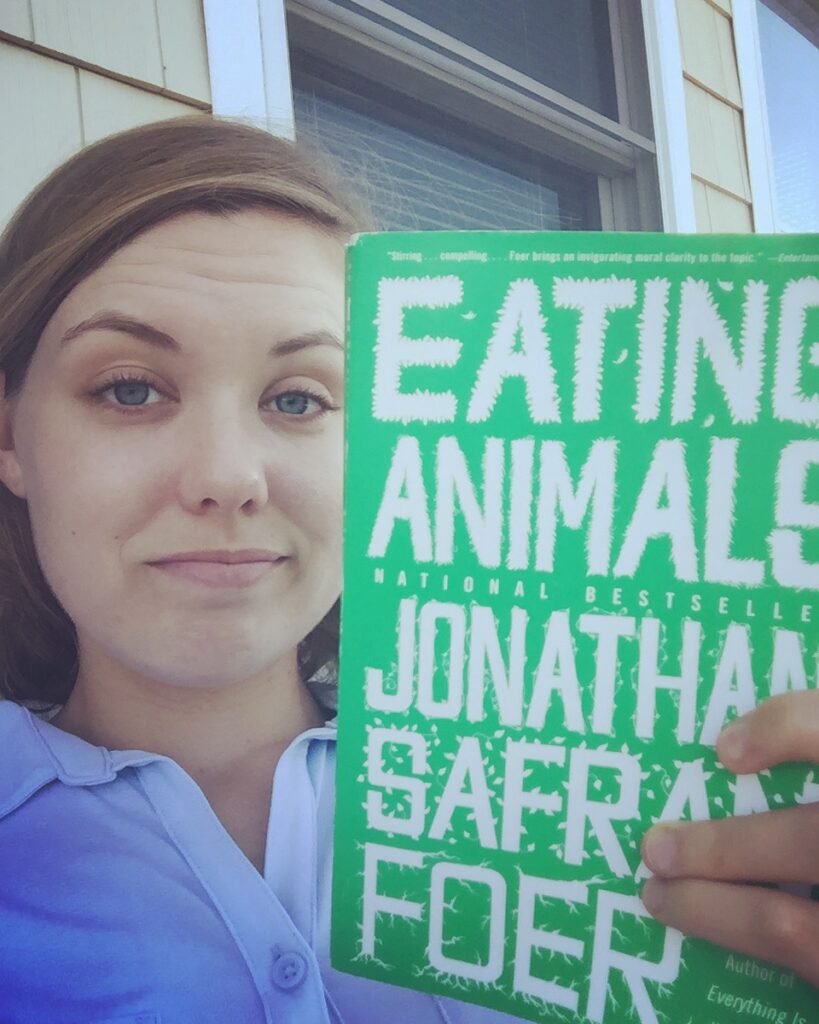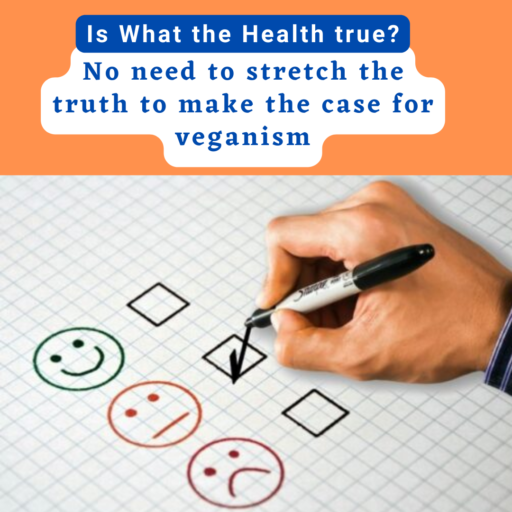PSA: There’s probably shit in your chicken. Along with pus, cancerous tumors, infections and antibiotics. Readers of Jonathan Safran Foer’s book Eating Animals are horrified to learn this, alongside many other even more concerning facts. Continue on for an Eating Animals book summary with the only take-aways from the research you need to know from the book.
You might know that our current system of industrial animal agriculture looks more like a horror movie than the idyllic farms of just sixty-some years ago. You might think you’d rather not know more. We don’t want to be told that these foods we love – burgers, bacon, even ice cream and eggs – are produced only by systematic abuse of and blatant disregard for animals, factory farm workers and our environment. But that’s the truth with our current system of industrial factory farming.
To eat industrial meat, you must either not know what goes on in factory farms or will yourself into forgetting. Over 99% of all land animals eaten or used to produce dairy and eggs in the US.. are factory farmed.
The true cost of cheap meat
The cost of vast production of cheap meat is your own health; dehumanizing work for usually poor, immigrant factory workers; unfathomably cruel treatment of animals as sentient as your pet; the spread of human disease; environmental destruction and the perpetuation of world hunger. How destructive does a culinary preference have to be before we decide to eat something else? Let’s take a look at the impact of factory farming:
1. Personal and public health
Chicken can legally contain up to eleven percent wastewater, made up of a “fecal soup” of feces, chlorine and bacteria that it absorbs in processing. Pigs are regularly fed blood plasma to make them gain weight faster and turkeys are often fed meat and sawdust. Factory farmed animals are fed antibiotics with every meal because the industry destroyed their immune systems. The animals you eat were never healthy; they were born sick, lived sick and died sick. Eating meat is also linked to cancer, stroke and heart disease.
Beyond individual health, factory farming is the main cause of avian and swine flu and many drug-resistant pathogens. We must end it to prevent future pandemics and protect ourselves against the antibiotic resistance crisis.
2. Cruel treatment of animals
Imagine your dog locked in a closet all its life, covered in blood and sores, never allowed to breathe fresh air or see the sky, as well as being tortured: branded with hot iron, dismembered, skinned and bled, all while fully conscious, like cows are (including dairy cows after they no longer produce milk); castrated without anesthetic like piglets are; sucked through pipes to an electrified plate, sent fully conscious through a wood chipper, and being genetically engineered to grow twice as fast and as large as they should be, like poultry are.
This would be an absolute outrage if this happened to our dogs, who are playful, curious and affectionate, just like the animals we do this to. We are violating animals’ right to live without cruelty. And aquaculture, by the way, is basically underwater factory farming: farm-raised fish live in conditions so foul that their eyes bleed, sea lice eat off their faces, and they become cannibalistic.
3. Dehumanizing work that takes advantage of the most vulnerable
Killing for a living leads ordinary people to become sadistic, beating animals with metal rods, strangling them, throwing them in manure pits to drown, extinguishing cigarettes on them, chopping off snouts and rubbing brine in the wounds, tearing off the heads of live birds, urinating in slaughter lines, spitting tobacco in animals’ eyes. No one is happy like this; this soulless work has made them this way. Working conditions of a typical slaughterhouse constitute human rights violations. Farm workers in these dangerous jobs are four times more likely to commit suicide than the general population.
4. Environmental destruction
According to Foer’s research, animal agriculture contributes 40% more to global warming than all forms of transportation combined; it is the number cause of climate change. It is among the top three causes of every environmental problem in the world.
Farmed animals produce about 130 times as much waste as the human population, which is supposed to go to giant “lagoons,” but often contaminate waterways and cause physical and mental diseases for nearby communities. Modern methods of catching fish in the wild destroy millions of other sea animals, like dolphins and whales. Oftentimes 80-90% of the catch is unintended and is thrown back into the sea, dead.
5. The perpetuation of world hunger
The millions of tons of grains required to sustain these animals is enough to feed the 1.4 billion humans living in dire poverty and help solve world hunger.
How could we justify eating factory-farmed animal products?
Sure, meat and animal products taste good. Sure, food is culture, habit and identity. But, tell me: What justification do we have as compassionate, conscientious people to eat factory-farmed meat and animal products?
The question is this: How much suffering and destruction are bacon, chicken nuggets, milkshakes and burgers worth? As Foer puts it, “Do we eat it because we’ve read the scientific literature on farmed animals and have decided their suffering doesn’t matter, or do we do it because it tastes good?”
As the author Foer reasoned: If we have the option to live without this violence, let us choose to do so. Let us leave a better legacy than the pursuit of cheap products. Let us exercise our compassion and reason as we sit down to eat and respond to the powerless and the voiceless. To support the barbarity of the factory farm would make us less ourselves because they embody the opposite of our values. In his words, “Whether we change our lives or do nothing, we have responded. To do nothing is to do something.”


